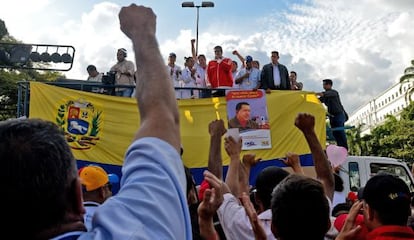‘Chavismo’ seeks ways to stay in power following heavy election defeat
Venezuela’s assembly speaker swears in a parallel parliament before opposition takes over

Venezuela’s ruling “Chavista” coalition has responded to the setback suffered in the December 6 parliamentary elections, when it lost its long-standing majority to the opposition Democratic Unity Roundtable (MUD), by installing a parallel “communal parliament” that aims to exercise the same powers of the National Assembly under the Constitution.
“I will give all the power to the communal parliament, and that parliament will be a legislative body of the rank-and-file people,” said Venezuelan President Nicolás Maduro on Tuesday. Although sections of the Chavistas and opposition leaders played down the announcement, others have called for an investigation into alleged irregularities that took place during the elections.
The communal parliament is aimed at not recognizing the landslide victory of the opposition
The communal parliament, which was sworn in by outgoing National Assembly speaker Diosdado Cabello – considered the second most powerful man in the government – on the last day of the legislative session (2011-2015) is part of a much more ambitious strategy aimed at not recognizing the December 6 landslide victory of the opposition.
MUD garnered a super majority of 112 seats compared to Maduro’s United Socialist Party of Venezuela (PSUV), which garnered 55 seats in the 167-seat assembly.
PSUV campaign manager and mayor of the Caracas municipality of Libertador, Jorge Rodríguez, announced that he will ask the Attorney General’s Office to investigate the “dirty tricks used by the opposition” during the elections.
Supporters who back chavismo said that in the state of Amazonas, a large rural region south of the country that is in now in the hands of the opposition, MUD paid between 2,000 bolivars (about $10 at the official government exchange rate) and 5,000 bolivars ($25) for each vote.
“This is a violation of the Constitution and electoral laws, and it is an attempt to undermine the electoral system,” Rodríguez charged.
Noted journalist Nelson Bocaranda suggested Tuesday that the government will challenge the election of 26 deputies, claiming similar irregularities described by the mayor.
The aim is to prevent the opposition’s power to legislate even with a qualified majority, and to impede the opening of the Venezuelan economy to foreign markets when the government is installed on January 5.
The opposition has downplayed the announcement, although it said it will take precautions. MUD executive secretary Jesús Torrealba said that in the Venezuelan Constitution the word “commune” is mentioned, but that “the only parliament that exists in this country is the National Assembly.”
“If they become bothersome,” he said, in reference to the government’s elected members, “we will work with our assembly, which has a qualified majority of 112 members.”
English version by Martin Delfín.
Tu suscripción se está usando en otro dispositivo
¿Quieres añadir otro usuario a tu suscripción?
Si continúas leyendo en este dispositivo, no se podrá leer en el otro.
FlechaTu suscripción se está usando en otro dispositivo y solo puedes acceder a EL PAÍS desde un dispositivo a la vez.
Si quieres compartir tu cuenta, cambia tu suscripción a la modalidad Premium, así podrás añadir otro usuario. Cada uno accederá con su propia cuenta de email, lo que os permitirá personalizar vuestra experiencia en EL PAÍS.
¿Tienes una suscripción de empresa? Accede aquí para contratar más cuentas.
En el caso de no saber quién está usando tu cuenta, te recomendamos cambiar tu contraseña aquí.
Si decides continuar compartiendo tu cuenta, este mensaje se mostrará en tu dispositivo y en el de la otra persona que está usando tu cuenta de forma indefinida, afectando a tu experiencia de lectura. Puedes consultar aquí los términos y condiciones de la suscripción digital.








































